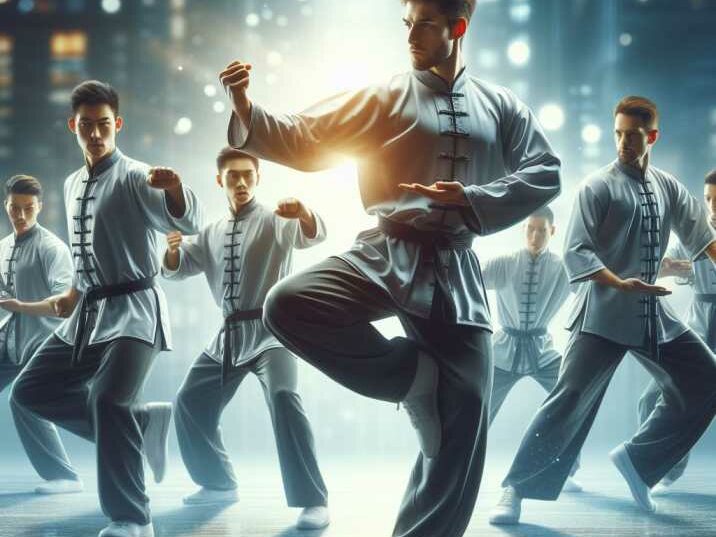Introduction:
Table of Contents
In today’s dynamic world, leadership skills and confidence are invaluable assets that pave the way for success. Many avenues exist for honing these qualities, but one often overlooked yet highly effective method is Kung Fu training. Combining physical discipline with mental fortitude, Kung Fu offers a unique platform for individuals to develop not only self-defense techniques but also essential life skills. In this article, we delve into how Kung Fu training promotes leadership skills and confidence in practitioners.

Understanding Kung Fu
Kung Fu, originating from China, encompasses a diverse range of martial arts styles characterized by fluid movements, intricate techniques, and philosophical principles. Its rich history dates back centuries, with each style embodying its own philosophy and approach to combat. From the graceful movements of Tai Chi to the explosive strikes of Wing Chun, Kung Fu is a holistic system that addresses physical, mental, and spiritual development.
Kung Fu Training Promotes Leadership Skills and Confidence
Building Discipline and Focus
At the core of Kung Fu training lies discipline and focus. Practitioners undergo rigorous training routines that demand commitment, perseverance, and self-control. By adhering to structured training regimens, students learn the importance of consistency and dedication in achieving their goals. Through repetitive practice and attention to detail, they cultivate a heightened sense of focus, enabling them to concentrate deeply on tasks at hand—a fundamental trait of effective leadership.
Cultivating Confidence Through Mastery
As individuals progress in their Kung Fu journey, they acquire proficiency in various techniques and forms. This mastery instills a sense of confidence that extends beyond physical prowess. The knowledge that one can defend oneself against potential threats breeds self-assurance and resilience. Additionally, the supportive environment of Kung Fu schools fosters camaraderie and mutual respect, further bolstering confidence and self-esteem.

Embracing Leadership Qualities
Kung Fu training inherently cultivates leadership qualities through its emphasis on respect, humility, and teamwork. In traditional Kung Fu schools, senior students often mentor junior counterparts, fostering a culture of mentorship and guidance. Through this mentorship dynamic, practitioners learn to lead by example, inspiring others through their actions and dedication. Moreover, the hierarchical structure of Kung Fu schools encourages students to assume leadership roles, whether in assisting with classes or organizing events, thereby honing their leadership skills in a supportive environment.
Nurturing Resilience and Adaptability
In the journey of mastering Kung Fu, practitioners inevitably encounter challenges and setbacks. Whether it’s grappling with a difficult technique or facing a formidable opponent, resilience is key to overcoming obstacles. Through perseverance and determination, students learn to embrace failure as an opportunity for growth rather than defeat. This resilience extends beyond the training hall, empowering individuals to navigate life’s challenges with grace and composure—a hallmark of effective leadership.
Integrating Mind, Body, and Spirit
Kung Fu is not merely a physical practice but a holistic pursuit that integrates mind, body, and spirit. Through meditation, breathing exercises, and philosophical teachings, practitioners cultivate a sense of inner harmony and balance. This holistic approach to self-improvement fosters a profound sense of self-awareness and mindfulness, essential qualities for effective leadership and decision-making.
Table of Information Kung Fu Training Promotes Leadership Skills and Confidence:
| Benefits of Kung Fu Training |
|---|
| 1. Improved discipline and focus |
| 2. Enhanced confidence and self-esteem |
| 3. Development of leadership skills |
| 4. Increased resilience and adaptability |
| 5. Holistic integration of mind, body, and spirit |
Conclusion:
In conclusion, How Kung Fu training promotes leadership skills and confidence. Kung Fu training offers a transformative journey that goes beyond physical fitness to cultivate leadership skills and confidence. By fostering discipline, focus, resilience, and holistic development, Kung Fu equips individuals with the tools they need to lead with confidence and integrity. Whether in the dojo or in daily life, the principles imparted through Kung Fu serve as a guiding light for those seeking to unlock their full potential as leaders.
FAQs:
- Is Kung Fu suitable for all ages? Answer: Yes, Kung Fu is a versatile martial art suitable for practitioners of all ages, from children to seniors.
- How often should I practice Kung Fu to see results? Answer: Consistent practice is key. Aim for at least two to three sessions per week to experience noticeable improvement.
- Can Kung Fu training help with stress management? Answer: Absolutely. The focus and discipline cultivated through Kung Fu training can help alleviate stress and promote mental well-being.
- Are there different styles of Kung Fu, and how do I choose? Answer: Yes, there are numerous styles of Kung Fu, each with its own unique characteristics. Research different styles and consider your personal preferences and goals before choosing.
- Is it necessary to spar in Kung Fu training? Answer: While sparring is a valuable aspect of Kung Fu training for practical application, it’s not mandatory for all students. Many schools offer non-contact or light-contact options for those who prefer a less intense approach.


